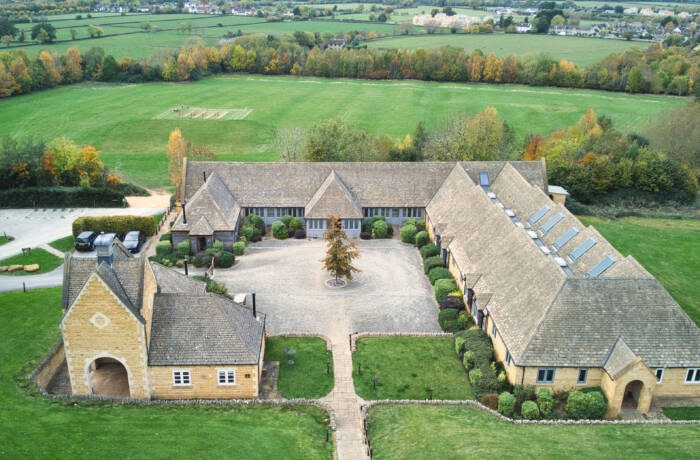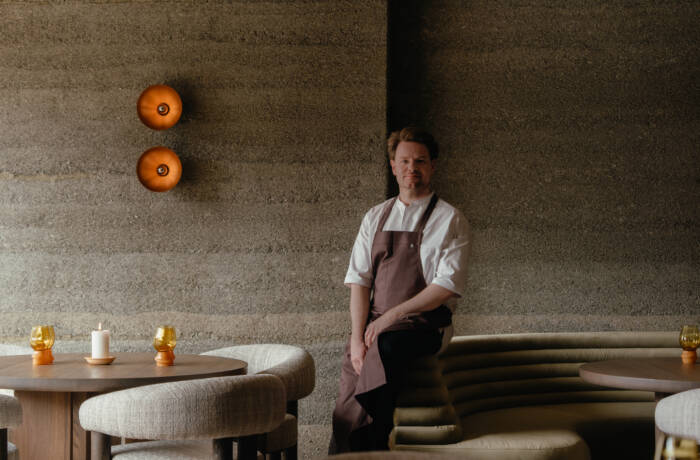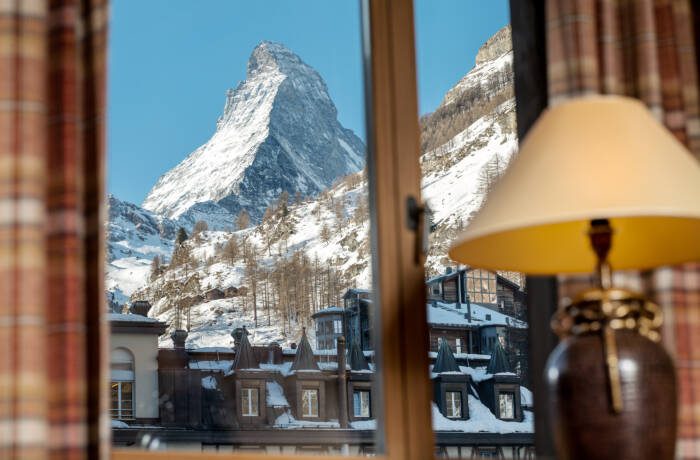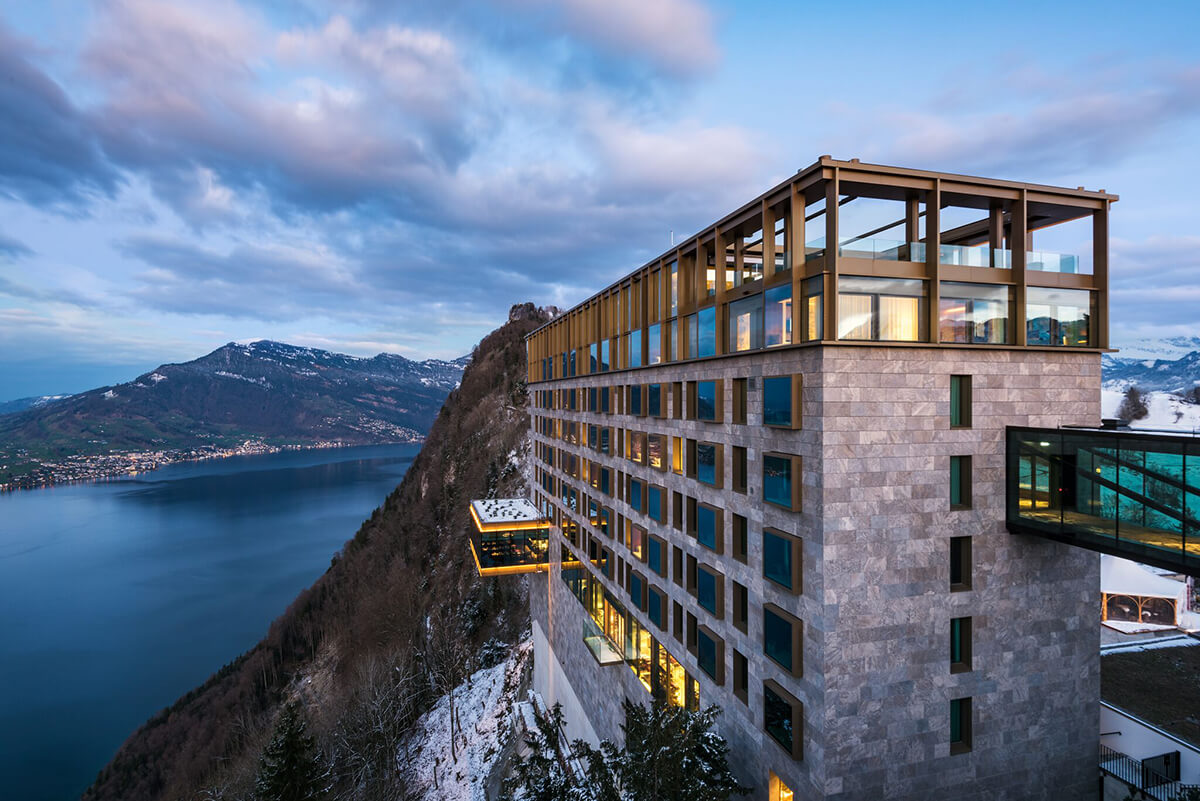
Perched on top of a mountain, the Bürgenstock Hotel boasts unparalleled views of Lake Lucerne
Bürgenstock is the most ambitious resort development in European history, a spectacular complex of luxury hotels, spas, contemporary restaurants and a high-end medical clinic perched on top of a mountain overlooking Lake Lucerne in Switzerland, on the site of a historic hotel and developed at a cost of 550 million Swiss francs by the Qataris. LUX Editor in Chief Darius Sanai speaks to Managing Director Bruno Schöpfer about the challenges and delights of creating something on a scale never done before

Bruno Schöpfer
LUX: Bürgenstock is not just about creating something for now, it’s also a vision of the future in many aspects. How did that come about?
Bruno Schöpfer: That’s a big question! First of all, the Bürgenstock Resort has a past, so it’s not something created from scratch. When I took over the whole development, I created a slogan called the ‘future has a past’ and, as an example, we held an exhibition with historic elements and future elements in order to show not only the press, but also internal people working on the project that we will honour the past. We want to protect our heritage because one day these global visitors will want to visit us to see not only our clear mountains, our air, our lakes, but also to see our history.
And then of course we wanted to recreate the stories about all the famous visitors such as Mahatma Gandhi or Audrey Hepburn (who lived here for 12 years). What great stories to have and to build on for the future. We have included all of these elements in the development of the resort.
Follow LUX on Instagram: the.official.lux.magazine
Another important element is food and beverage, especially for Asians, [for whom] food is immensely important. At breakfast they talk about what they want for lunch and at lunch they talk about what they want for dinner. So the food element is key to the resort. We tailored it to our future visitor markets. Not that we wanted to forget our Swiss.We know the Swiss are also well travelled and will enjoy Spices restaurant with its Chinese, Indian, Japanese, Thai cuisine, and they will enjoy Sharq, the oriental restaurant with Lebanese mezze and Persian grills. All of these elements together, I think, are a cocktail for success. The resort, as the largest of the developments in Switzerland, is what we call the beacon – in German we call it the leuchte – to bring visitors to Switzerland.
LUX: How did you choose the brand name for the emerging group?
Bruno Schöpfer: We have three historic brands: the Schweizerhof, the Royal Savoy – which, in my opinion, has the biggest potential for international development because it is unique – and of course the Bürgenstock brand. Again, it is very much a Swiss brand – it has been in place for 145 years – and we decided this would become the umbrella brand for the properties.
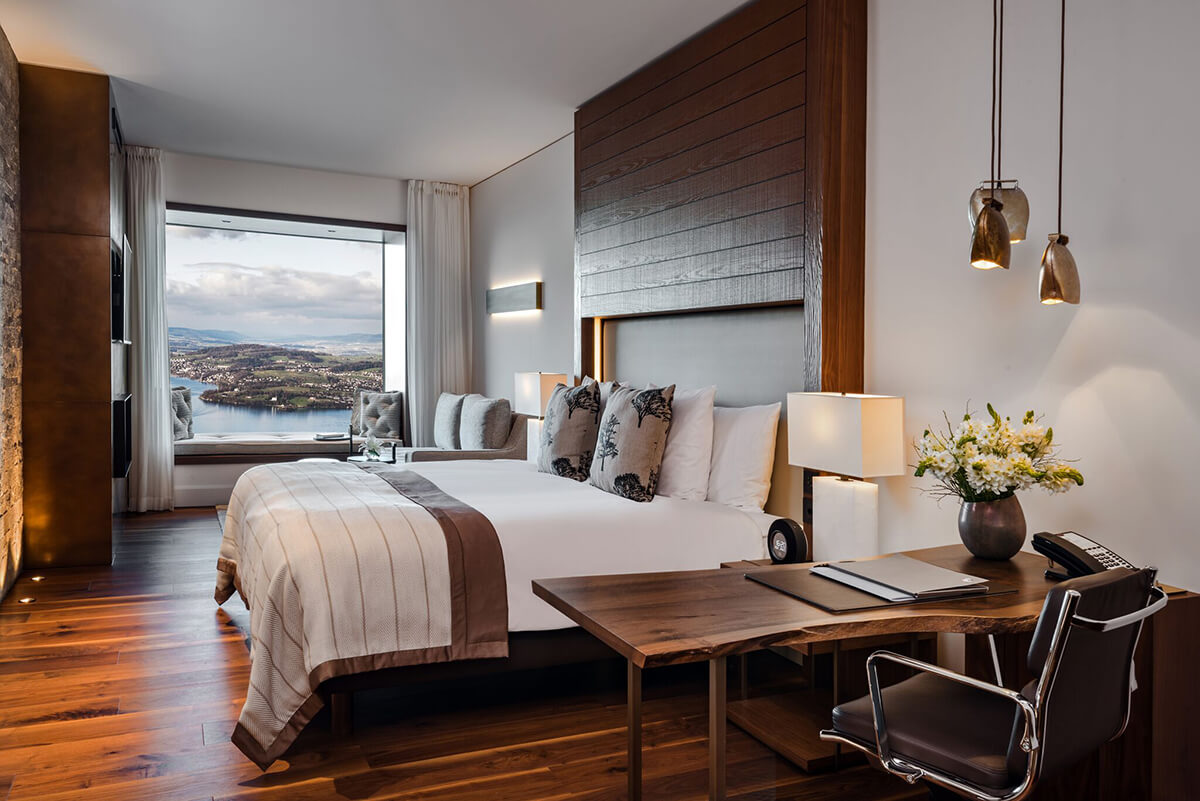
A Deluxe Lakeview Room at the Bürgenstock Hotel
LUX: Is there potential for expanding the brand beyond Switzerland?
Bruno Schöpfer: There is potential, but for the last ten years we have been focusing on conceptualising and renovating these wonderful assets – we’ve spent one billion Swiss francs on them – and I think the next focus should be to market these globally. And then as a next step yes, I can see an expansion, but one step after another. Now we have established, next is to market it globally and then, yes, there could be an expansion.
LUX: In the past F&B was more incidental to the hospitality concept in Europe, whereas here the restaurants are really a destination in themselves, with their own identity. You didn’t bring other brands in to run your restaurants – what was the thinking behind that?
Bruno Schöpfer: My passion is F&B. I started off my career as an F&B manager in famous hotels such as Mandarin Oriental Bangkok and in my spare time, my hobby is to look at amazing hotels and restaurants. Because of that knowledge, I’ve met and worked with some amazing talent. I basically felt that we would be able to manage with our own global talent. We do have one association and that’s with Marc Haeberlin, who has a three Michelin-star restaurant in Alsace and is the consultant chef at RitzCoffier. We very much put a focus on absolutely great talent. I myself have worked in Thailand, Malaysia and the Philippines; the executive chef/culinary director worked in the Philippines, Thailand, Switzerland and the US.
Read more: New levels of sophistication in Ibiza Town
LUX: You’ve created a new dining concept in each of the locations – was that with an eye to the future market?
Bruno Schöpfer: That’s a very good question. If a Swiss goes on holiday to China, after one week he is looking for his Swiss sausage salad. Today’s international traveller from, let’s say, China or India, is no different. After a couple of days, they want their authentic, national cuisines. We know that in Switzerland there are very few really good oriental restaurants. So the key to our success will be to create many cuisines in the hotels in which we operate. I know very well that these markets will change and develop, and before long – especially the Chinese and Indian markets – they will become a lot more sophisticated, and the need for their cuisine will always be there. We always have the future markets in mind. And we’re not surprised that we’re seeing a Swiss liking for such cuisines; the Swiss are a big travelling nation and you see them in all the markets. For them, it’s very emotional if they can eat a good Thai, Japanese or Indian meal here at home.
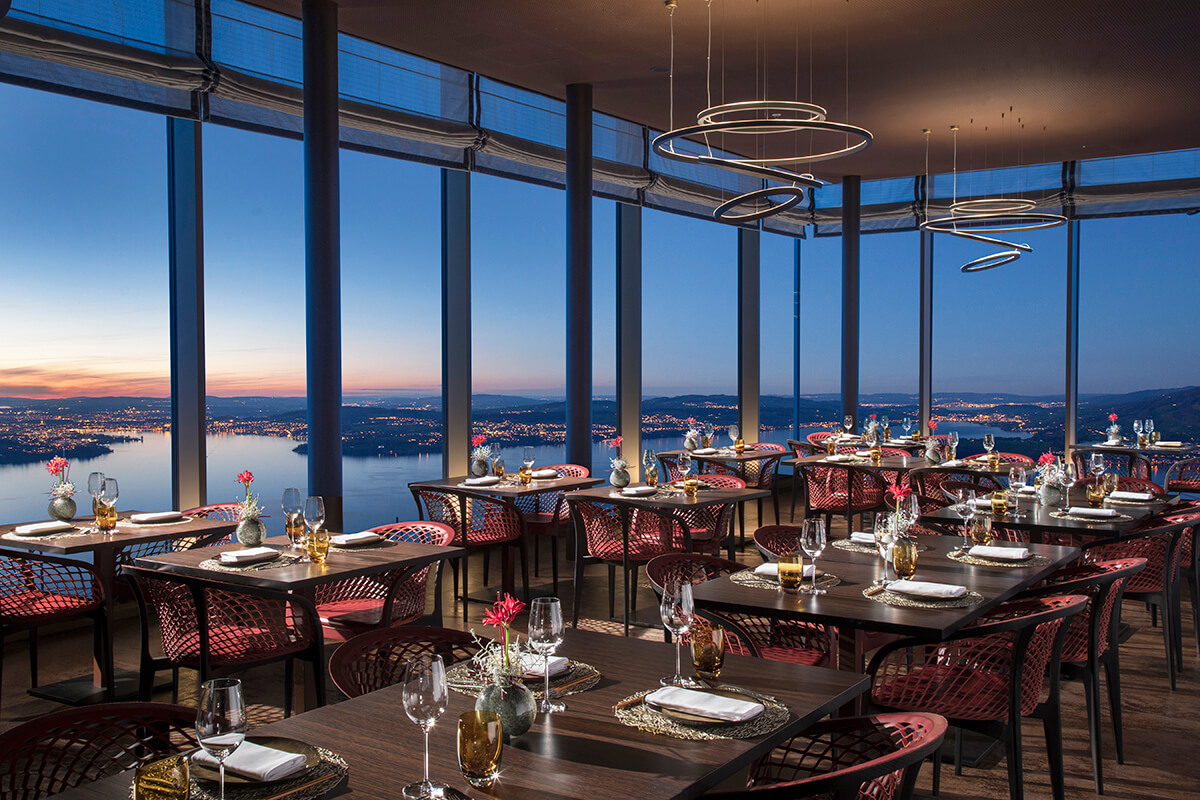
Spices Kitchen & Terrace overhangs Lake Lucerne with an open kitchen
LUX: What’s the difference between creating Bürgenstock as a resort and creating Bürgenstock the brand?
Bruno Schöpfer: One advantage is that the brand goes back 145 years. It was once a great brand, but a lot of people will agree it is much easier to reenergise a brand than to create one. We are not a large company here who can put hundreds of millions of dollars behind the creation of a brand. We made the decision with the Schweizerhof, the Savoy and Bürgenstock to keep the historic branding; they have a following and a history. It’s all about brand protection and brand management. If you start a new brand it can be quite a challenge just to be registered. We have succeeded with ours because they have been in the market for so long, all of them. But now it’s a matter of how we reload and reenergise them, because a brand is only as good as its content.
LUX: Is Bürgenstock a reason to come to Switzerland for your many of your guests who otherwise wouldn’t? Are they coming here instead of going elsewhere?
Bruno Schöpfer: I think Bürgenstock should become a reason for people to come to Switzerland. We compete when it comes to the inter-continental travel market for travellers’ time. We need to give an international traveller enough attractions, or what I call ‘wow’ factors. It’s all about ‘wow’ today. We want people to come to our resort, pull out their phone and send a WhatsApp picture to their friends. They call it mouth-to-mouth advertising. We want that to happen.
We want to create not one USP, but many USPs, and if you look around here in the resort, you see lots of ‘wow’ factors. Is it the spa with the infinity pool 500metres above Lake Lucerne? Is it the Spices restaurant overhanging the lake and with its amazing open kitchen? Is it the health and medical wellness facility? There are lots of ‘wow’ factors. The reason is very simple. We want the people who visit us for a restaurant to be so impressed that next time they will stay here three days. And we can see that happening right now – it’s high season and we have a lot of Middle Eastern traffic. Most of the people who check-in extend their stay. Just yesterday I had someone staying for two nights who extended his trip by another two nights because, he says, ‘I cannot see it all in two days, I need four!’
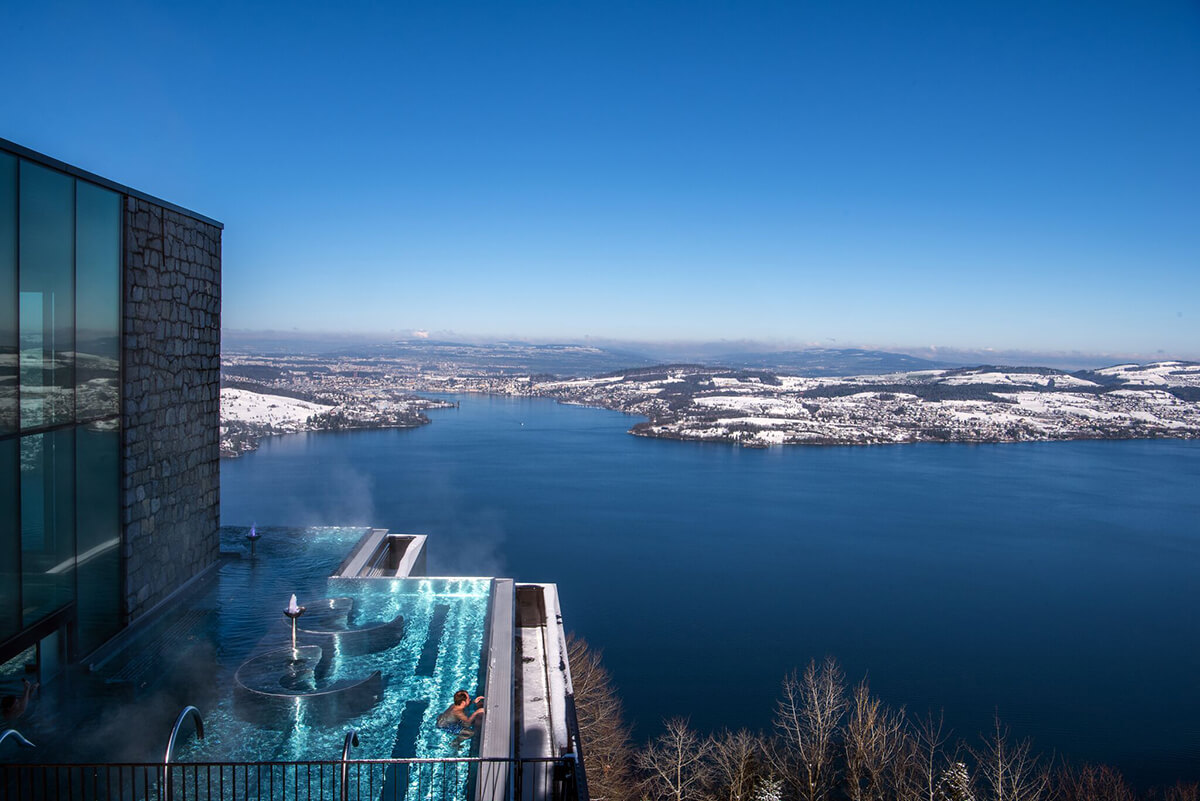
The infinity pool at the Alpine Spa, 500 metres above Lake Lucerne
LUX: You’ve been in the luxury travel industry for a while now. How has luxury travel and the leisure traveller changed over the last twenty years?
Bruno Schöpfer: The biggest change happened, in my opinion, with 9/11. From then on we’ve been seeing a lot more private air travel. Here we have the great advantage of a private air strip and four helicopter pads, so we’re seeing more people arrive by private planes and helicopters. Another change is that people are having more holidays. The historic holidays of people staying in the resort for two weeks are now less common. When it comes to our Bürgenstock Hotel and the Palace, the average stay is two or three days.
LUX: Are travellers’ demands higher now?
Bruno Schöpfer: As a whole, yes, demands are much higher. I would say that in the luxury sector generally service has improved. We are a lot more customer-oriented than in the past. Social media and online rating systems put everyone on their toes and make it more demanding, because people can read about it for themselves on Google. But I think the key has to be employing talented people who are interested and passionate about what they do. I always say I’ve never worked a day in my life. In other words, you have to have fun. If you’re not having fun then what are you doing? If it’s not fun then it’s really boring. We need more people who really enjoy what they’re doing, and I think here we offer a surrounding that gives you that. But of course it’s a tough job…I don’t want to glamourise it. It’s a tough job with high occupancies, full restaurants and lots of check-ins and check-outs. If you don’t enjoy what you’re doing it would be difficult.
Read more: Sassan Behnam-Bakhtiar in conversation with Jean Cocteau
LUX: You’ve been open a year now – what have been the greatest challenges?
Bruno Schöpfer: How long do we have? First of all it was a challenge to just get everything ready. When you’re building thirty buildings all to a certain standard, with high interior design specifications, you need to have an amazing team and really passionate people around you. You need to communicate well with your builders. There are so many elements that have to come together from all over the world: marble from Italy, case goods from China…it’s a fantastic logistical masterpiece. And of course you have delays. When things are not there you have to be creative and know how to overcome a certain shortcoming.
Another challenge is the defects: when you take a building into operation it looks great, but you flush a toilet or have a shower for the first time and you realise there are a few issues that you need to fix. That’s normal for building projects. These rectifications are very strenuous and time-consuming because they involve not one but sometimes half a dozen parties. That’s challenging.
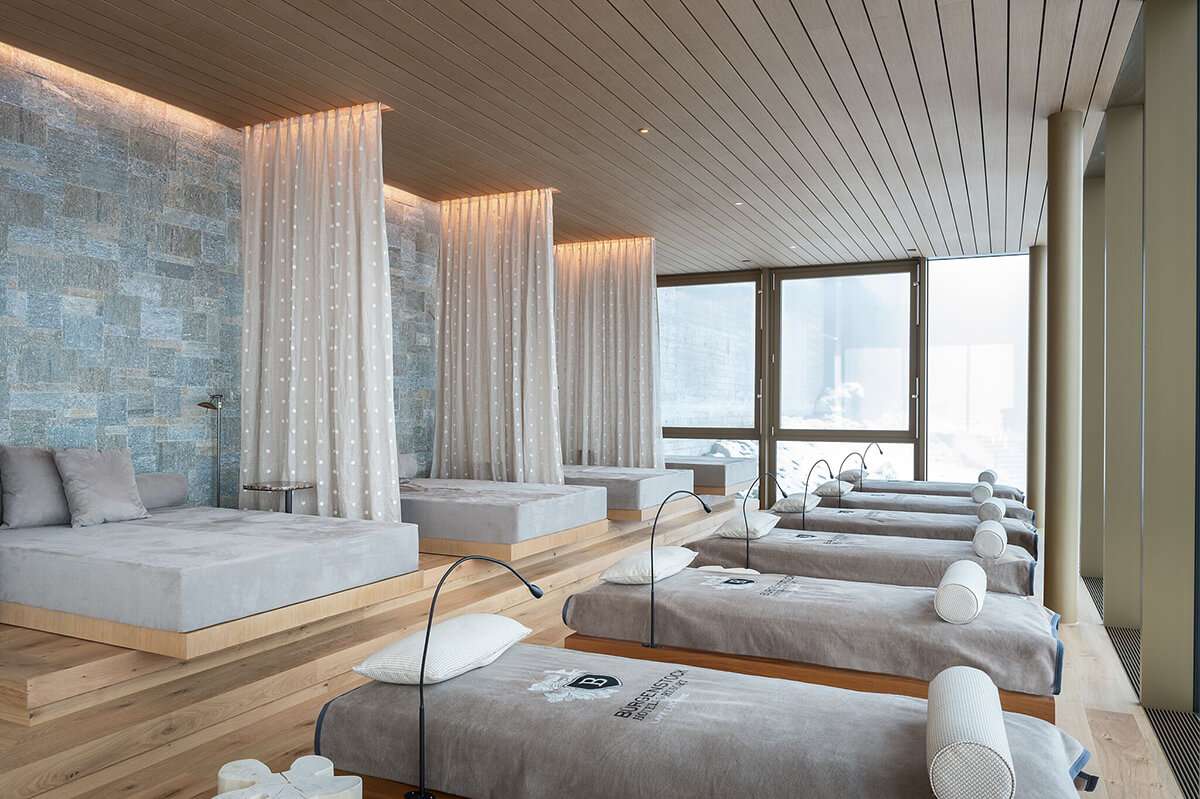
The silent room at the Alpine Spa
Another challenge for us is the weather. When we have wonderful weather we have perhaps three times more visitors than when we have bad weather, and the implications of that can be tremendous in both cases. You might have full fridges, but the weather is less good so you have less day visitors. But then you might suddenly have wonderful weather and you have three times more visitors than expected. We had amazing weather in September, so when people heard the resort was opening we were flooded with thousands of people. That put a lot of strain on the team and the restaurants, all of which were not yet used to the operation.
There’s also training and retaining staff. The fact is, when you hire a team, not everyone will stay. Twenty percent might leave because they don’t like the job, or you don’t like them, and so you need to re-recruit. So that was basically the first year. But the main challenge besides the usual delays of construction and the defects was the tremendous level of business we had. We opened with full hotels, full restaurants and that has been quite a challenge.
Read more: Wendy Yu on building bridges between the East and the West
LUX: The resort must require a big team – how do you find your staff?
Bruno Schöpfer: There is a staff issue in Switzerland. We have a big pharmaceutical industry and a banking industry; in other words, we have many competing industries with tourism. Fifty percent of our graduates from École hôtelière de Lausanne, my alma mater, join banks, the famous food companies. So, how do we bring 700 people to work here? One strategy from day one was to build at least two hundred staff rooms in the resort to provide convenience for staff members. We now have 200 staff members who live in the resort, so we provide them the fantastic convenience of walking five minutes to work. No commuting – that’s one way to bring staff here. People who are interested and passionate about the industry love to work with such an amazing brand because it’s great for their CV. The chefs love to work here because we are not a boring Swiss restaurant. Young people find this a very interesting and enriching resort to work in. They can learn. When it comes to these great restaurants we needed specialists from these countries. In Switzerland we have very strict labour restrictions, so we couldn’t hire someone from Thailand without a labour permit. We had to obtain what are called third-country permits to hire people from Iran, Lebanon, India, Thailand, China and Hong Kong, who bring the authentic know-how of these cuisines to us. We don’t want to create fusion food, we want to create original dishes. To achieve this we need the right employees.
LUX: We have a lot of readers and friends who historically will go for their detox weekends to Lanserhof or Merano; will this be an alternative?
Bruno Schöpfer: We would love to be an alternative, but we are also aware that we cannot create that in twelve months. You’ve actually just touched on a business I’m very passionate about. I have visited – although I don’t look like it – every place under the sun when it comes to the likes of Lanserhof and Merano, and when I created the concept of the resort in 2008, I asked myself what the next big thing in Swiss tourism was. Nowadays every hotel has residences, ballrooms, the traditional spas. We must be able to take advantage of the reputation of Swiss medical treatments. The King of Saudi Arabia comes to Geneva for medical treatments, the ruler of Doha flew in after he broke his leg for treatment in Zurich, we have a lot of Chinese who come to Switzerland for what we call the ‘sheep’ treatment [a treatment involving the injection of stem cells from sheep]. So there is a lot of history and outstanding medical treatment here in Switzerland.
When we developed this concept I had the help of a doctor and I created a medical advisory board. We basically looked at five business segments which we have now developed. One segment is what we call the medical recovery where people recover from musculoskeletal operations and cancer treatment. But we are not a hospital and we don’t want to be one because that is a totally different investment. We don’t want to be in competition with hospitals – there are plenty of operating theatres in Switzerland – we want to work with hospitals. So the rehabilitation section is where people are rehabilitated after they have been operated on in surrounding hospitals.
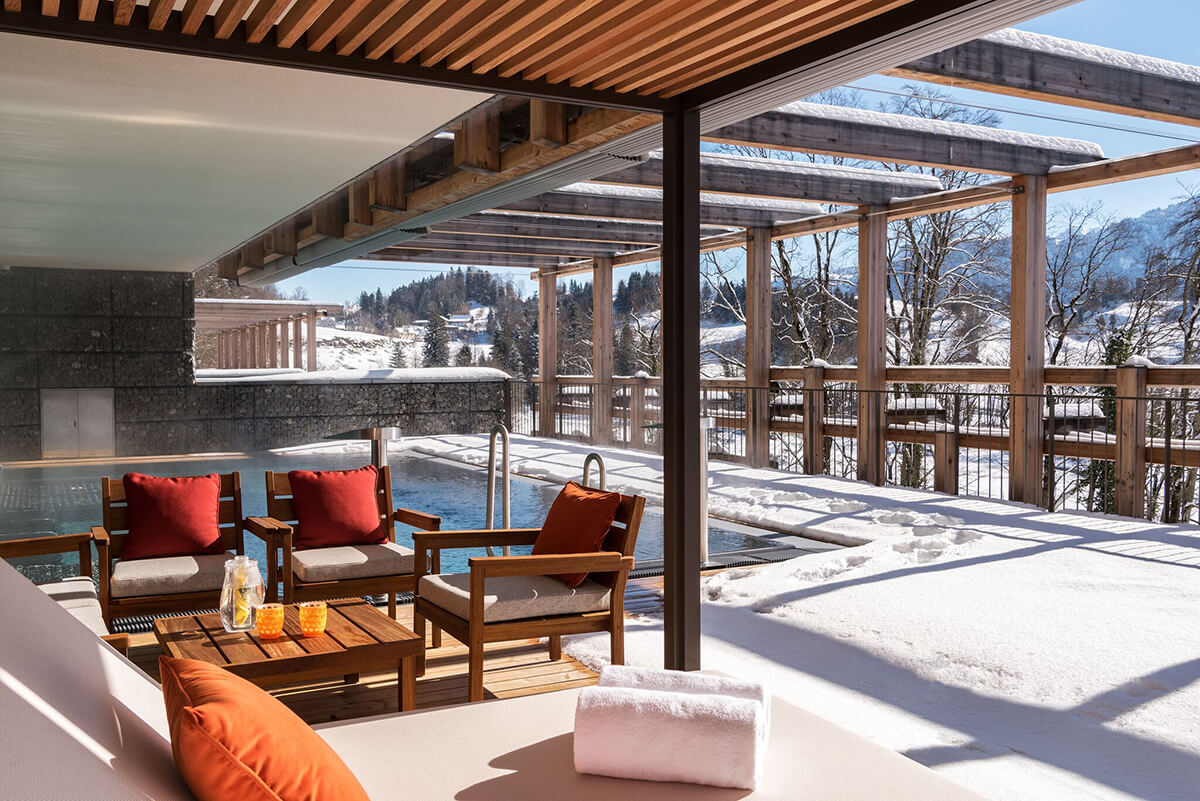
The outdoor pool at the Waldhotel Spa
We have a detox and weight-loss segment. There is also a basic need for the medical check-up, not a ‘hocus-pocus’ one but a proper medical check-up which analyses bone, muscle and fat density, hormones, etcetera. Another special element is psychosomatic rehabilitation, which I approached from a business point of view. Together with cancer, burnout is the fastest-growing condition in the population, especially in a place like Switzerland where we are all in the tertiary sector and under immense pressure to deliver. Burnout is prevalent. This is big business for us – sorry if I call the wellbeing of others a business – but we have a facility here which is pristine, where you can have a perfect sleep in the perfect surroundings, with green mountains and fresh air where you can recharge your batteries. We are in a fantastic location to do this. That is one of our other areas of expertise. The last one is all to do with anti-ageing, because people want to look better. I hate the word anti-ageing – we call it ‘better ageing’ – but it’s everything about skin and looks. We have Dr Jalili, a very good dermatologist, and of course botox is a part of it all too; that’s basically what the Waldhotel offers.
At the end of the day, the resort is a one-stop shop in one place and in two days you can do a total medical check-up on the spot. It’s very efficient.
LUX: Where will Bürgenstock the brand be in 10 years?
Bruno Schöpfer: I’d love to see another couple of hotels. I hate to say ten hotels in ten years…I don’t believe in that. I’d much rather see two or three hotels that are just right rather than growing for the sake of growing. Let’s just do it right. A good brand needs to develop in its own time. It’s also very difficult to recreate a place like the Bürgenstock Resort. It’s unique.
LUX: That was my next question – how will you find anywhere else, is there anything else like this?
Bruno Schöpfer: There could be, there could be. But one has to look very carefully. It’s difficult to find a place with this amazing history, this privileged location, these amazing buildings and atmospheric hotel village. But never say never..
For more information on the resort and facilities visit: buergenstock.ch

